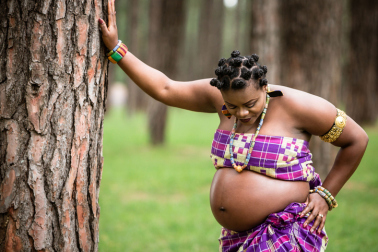
Source: Solomon Mochiah / EyeEm / Getty
On Tuesday, April 13, Vice President Kamala Harris unveiled the White House’s first-ever proclamation declaring April 11 to 17 Black Maternal Health Week and announcing a $200 million budget to fund implicit bias training for healthcare providers and expansions to the Rural Maternity and Obstetrics Management Strategies (RMOMS) program. In the same week, Congresswoman Lauren Underwood underscored the Black Caucus’s commitment to improving Black maternal health through the Momnibus Act. Introduced back in February by Underwood, Congresswoman Alma Adams and Senator Cory Booker, the Act allocates funding to community-based organizations, improves care for incarcerated moms, and expands the use of digital tools, like telehealth, to increase Black women’s access to medical services.
These developments are the result of years-long organizing by Black women across the country led in large part by the advocacy efforts of the Black Mamas Matter Alliance, a cross-sectoral alliance founded in 2013 to address the alarming maternal health crisis facing Black mothers in the U.S. BMMA formed to change policy, cultivate research, shift culture, and advance care for Black mamas who, due to bias, racism, and negligence, are more than three times more likely than their white counterparts to be the victims of pregnancy-related deaths.
Racism towards Black women is pervasive and has a particularly horrific history in medicine. Marion Simms, a white doctor credited as the father of modern gynecology, experimented on the Black women he enslaved without anesthetic or consent. Unfortunately, it comes as no surprise that the racist foundations of reproductive health continue to dehumanize, abuse, and murder Black women.
To address the generations of medical neglect, abuse—and in Simms’ case—downright torture – the Black Mamas Matter Alliance (BMMA) created Black Maternal Health Week, an annual observance to heighten awareness around the dismal health disparities for Black mothers, and to amplify the Black women doctors, nurses, midwives, doulas, academics, researchers who are leading the charge to find solutions. Since 2018, Black Maternal Health Week has convened thousands of Black women for conversations, panels, town halls, and film screenings to champion holistic care for Black mothers.
Black Maternal Health Week has increased both in size and scope, attracting attention and support from many, including Black women celebrities and thought leaders who are using their platforms to speak out about their own experiences. This year BMMA welcomed Grammy Nominated Singer-Songwriter Kelis as the keynote speaker for its virtual conference. In her remarks, the mother of three encouraged Black mamas and those who love and care for them to “become comfortable in advocating because, at the end of the day, if we don’t, who will?” In alignment with this year’s conference theme, “Claiming Our Power, Resilience, and Liberation,” Kelis empowered attendees declaring, “The boat is meant to be rocked.”
Last week, Black women entrepreneurs took part in a special tech panel to highlight the ways they’re disrupting the Black Maternal Health crisis through trailblazing digital innovations designed to support Black mothers and their communities. Kimberly Seals Allers, a former senior editor at Essence and founder of the app Irth, stressed the importance of connecting and collaborating. Despite naysayers, through grant funding Allers created Irth with a team of Black women. “No matter what you’re doing, community is going to be needed. And, if you don’t have it, you’re gonna have to create it.”
Erica Chidi, co-founder of the digital sexual and reproductive health education platform LOOM, emphasized how centering the issues of Black women positively impacts everyone. “When you design for the most marginalized person, the entire society ends up benefitting,” Chidi explained.
These Black women’s successes in spaces not designed for them is Black girl magic in action, especially in the tech industry, which is dependent on venture capital funding to materialize digital innovations. According to ProjectDiane, from 2018 to 2019, Black and Latinx women combined received less than one percent of the total venture capital investments. As evidenced by Chidi’s $3 million seed investment to launch LOOM, Black women are making waves.
“You don’t need to have all the skills to build the vision,” she said. “The people you need will come.” Black Mamas Matter Alliance is a testament to this as they continue to raise crucial funding and use digital and social media to spark conversations and encourage action from grassroots to national. These efforts are also receiving attention on Capitol Hill as evidenced by the new Black Maternal Health Week resolution, as well as Vice President Harris’ crediting BMMA’s work as foundational to federal initiatives addressing the urgent disparities facing Black mothers.
When Black women commit to caring for ourselves and each other by tapping into our talents and gifts, rock the boat and create waves that can result in lasting change. By simultaneously demanding equity and creating our own communal care structures, we can restore birth’s sacredness, a joyful experience that all Black mothers deserve.
MJ VanDevere is an editor, screenwriter and scholar out of Nashville, TN. Follow her at @MJVanDevere.


